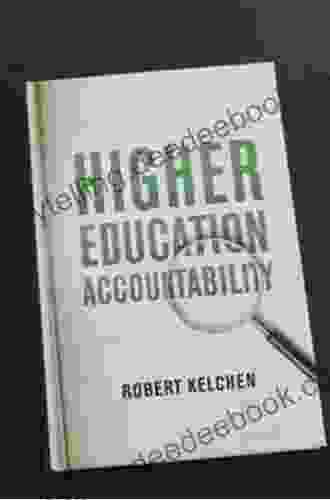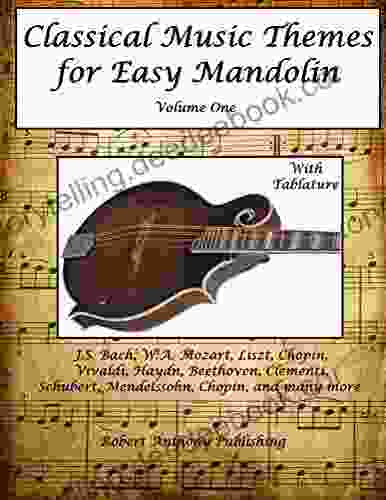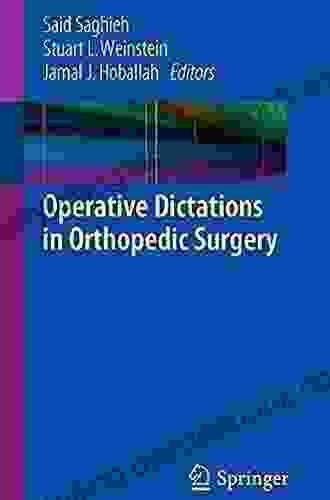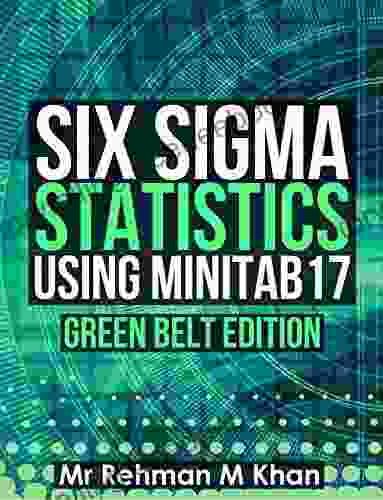Unveiling the Intricacies of Operative Dictations in Orthopedic Surgery: A Comprehensive Guide

Operative dictations play a pivotal role in orthopedic surgery, serving as the foundation for accurate medical records and effective communication among healthcare professionals. These detailed accounts of surgical procedures provide a comprehensive record of the surgical intervention, ensuring that all aspects of the operation are meticulously documented for future reference and analysis.
5 out of 5
| Language | : | English |
| File size | : | 515 KB |
| Text-to-Speech | : | Enabled |
| Screen Reader | : | Supported |
| Enhanced typesetting | : | Enabled |
| Print length | : | 414 pages |
Components of an Operative Dictation
An operative dictation typically includes the following essential components:
- Patient demographics: Name, age, medical record number, date of surgery
- Procedure details: Date and time of surgery, type of procedure performed, surgical approach
- Preoperative findings: Examination findings, preoperative imaging results, relevant medical history
- Intraoperative findings: Description of the surgical site, encountered pathology, surgical techniques employed
- Postoperative findings: Assessment of surgical outcome, any complications encountered, postoperative instructions
- Dictation signature: Name and signature of the surgeon
Benefits of Accurate Operative Dictations
Accurate and comprehensive operative dictations offer numerous benefits, including:
- Improved patient safety: Accurate documentation ensures that all relevant information is available for future decision-making, reducing the risk of errors or omissions.
- Enhanced communication: Dictations provide a clear and detailed record of the surgical procedure, facilitating effective communication between surgeons, other healthcare providers, and patients.
- Accurate billing: Detailed dictations support accurate billing practices by ensuring that all procedures and services performed are appropriately documented.
- Quality assurance: Dictations enable the evaluation of surgical outcomes and the identification of areas for improvement, contributing to the ongoing enhancement of surgical practice.
- Legal protection: Accurate dictations provide legal protection for surgeons, as they serve as a verifiable record of the surgical intervention.
Challenges in Operative Dictation
Despite their importance, operative dictations can present several challenges:
- Time constraints: Surgeons often face time pressures during surgery, which can lead to rushed or incomplete dictations.
- Technical difficulties: Dictation software or speech recognition systems can occasionally experience technical issues, affecting the accuracy or completeness of the recording.
- Fatigue: Prolonged surgeries can lead to surgeon fatigue, which can impair dictation accuracy and clarity.
- Subjectivity: Dictations are inherently subjective accounts of the surgical procedure, which may vary from surgeon to surgeon.
Best Practices for Operative Dictations
To ensure the accuracy, completeness, and quality of operative dictations, surgeons should adhere to the following best practices:
- Dictate promptly: Dictate the operative summary as soon as possible after the surgery, minimizing the risk of memory lapses or omissions.
- Use clear and concise language: Avoid medical jargon or abbreviations that may not be understood by all readers.
- Be specific and detailed: Provide comprehensive descriptions of the surgical procedure, including all relevant findings and observations.
- Proofread and edit: Carefully review and edit the dictation before finalizing it to ensure accuracy and completeness.
- Utilize dictation software or speech recognition: Consider using dictation software or speech recognition systems to improve dictation efficiency and accuracy.
- Involve a scribe: In complex or lengthy surgeries, consider involving a scribe to assist with documentation and ensure accuracy.
Quality Assurance for Operative Dictations
Regular quality assurance measures are essential to ensure the accuracy and completeness of operative dictations. This may involve the following steps:
- Peer review: Have a colleague or peer surgeon review the dictation to identify any discrepancies or areas for improvement.
- Data mining: Utilize data mining techniques to identify trends or patterns in dictation accuracy and completeness.
- Regular audits: Conduct regular audits of operative dictations to assess compliance with best practices and identify areas for improvement.
Operative dictations are indispensable tools in orthopedic surgery, providing a detailed and accurate record of surgical interventions. By adhering to best practices, surgeons can ensure the accuracy and completeness of their dictations, contributing to improved patient safety, enhanced communication, and ongoing quality improvement in orthopedic practice.
5 out of 5
| Language | : | English |
| File size | : | 515 KB |
| Text-to-Speech | : | Enabled |
| Screen Reader | : | Supported |
| Enhanced typesetting | : | Enabled |
| Print length | : | 414 pages |
Do you want to contribute by writing guest posts on this blog?
Please contact us and send us a resume of previous articles that you have written.
 Novel
Novel Page
Page Story
Story Genre
Genre Reader
Reader Library
Library Paperback
Paperback Magazine
Magazine Newspaper
Newspaper Paragraph
Paragraph Sentence
Sentence Bookmark
Bookmark Shelf
Shelf Bibliography
Bibliography Annotation
Annotation Scroll
Scroll Codex
Codex Library card
Library card Biography
Biography Reference
Reference Encyclopedia
Encyclopedia Narrator
Narrator Card Catalog
Card Catalog Borrowing
Borrowing Stacks
Stacks Periodicals
Periodicals Research
Research Scholarly
Scholarly Reserve
Reserve Academic
Academic Journals
Journals Rare Books
Rare Books Literacy
Literacy Study Group
Study Group Thesis
Thesis Dissertation
Dissertation Storytelling
Storytelling Book Club
Book Club Theory
Theory Textbooks
Textbooks Mike Smylie
Mike Smylie Charles Foti
Charles Foti Donald E Weatherbee
Donald E Weatherbee Alyssa Hollingsworth
Alyssa Hollingsworth Michael Punke
Michael Punke Anne Mitchell Whisnant
Anne Mitchell Whisnant Julie Otsuka
Julie Otsuka Gordon Grob
Gordon Grob Dr Carol Morgan Phd
Dr Carol Morgan Phd Merete Kruuse
Merete Kruuse Shaun Mckenna
Shaun Mckenna Geoff Watts
Geoff Watts Bill Zehme
Bill Zehme Maddison Cole
Maddison Cole A C Deas Ii
A C Deas Ii Jim Kennison
Jim Kennison Karen Donovan
Karen Donovan Mary Lois Kissell
Mary Lois Kissell Denise Gibb
Denise Gibb Dawn Tripp
Dawn Tripp
Light bulbAdvertise smarter! Our strategic ad space ensures maximum exposure. Reserve your spot today!

 Billy FosterHumbugged Happy Cat: A Cozy Mystery Series That Will Warm Your Heart and Keep...
Billy FosterHumbugged Happy Cat: A Cozy Mystery Series That Will Warm Your Heart and Keep...
 Carl WalkerHigher Education Accountability: Exploring Models and Challenges with Robert...
Carl WalkerHigher Education Accountability: Exploring Models and Challenges with Robert... Jackson HayesFollow ·16.9k
Jackson HayesFollow ·16.9k James JoyceFollow ·17.6k
James JoyceFollow ·17.6k Corey HayesFollow ·7.6k
Corey HayesFollow ·7.6k Brent FosterFollow ·6.6k
Brent FosterFollow ·6.6k Jamal BlairFollow ·14.8k
Jamal BlairFollow ·14.8k Ralph TurnerFollow ·16.5k
Ralph TurnerFollow ·16.5k Bob CooperFollow ·4.4k
Bob CooperFollow ·4.4k Kelly BlairFollow ·13.1k
Kelly BlairFollow ·13.1k

 Howard Blair
Howard BlairClassical Music Themes for Easy Mandolin, Volume One
Classical Music Themes for Easy Mandolin,...

 Paulo Coelho
Paulo CoelhoThe Heretic Tomb: Unraveling the Mysteries of a Lost...
Synopsis In Simon Rose's captivating debut...

 Rodney Parker
Rodney ParkerThe Passionate Friends Annotated Wells: A Deeper...
Unveiling the...

 Ed Cooper
Ed CooperDelicious Stories of Love, Laughs, Lies, and Limoncello...
In the heart of...

 Elmer Powell
Elmer PowellHal Leonard Piano For Kids Songbook: Unleashing the...
Music holds immense...
5 out of 5
| Language | : | English |
| File size | : | 515 KB |
| Text-to-Speech | : | Enabled |
| Screen Reader | : | Supported |
| Enhanced typesetting | : | Enabled |
| Print length | : | 414 pages |









